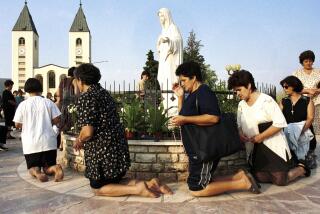Vatican Condemns Human Artificial Reproduction
- Share via
In a strongly worded document that defines the moral standards of the Roman Catholic Church, the Vatican has condemned artificial insemination, embryo and sperm banks, surrogate parenthood and the technology that produces “test-tube babies.”
The paper, released today, also calls on governments to outlaw all such procedures as well as abortion.
The 40-page document, “Instruction on Respect for Human Life in Its Origins and on the Dignity of Procreation,” amounts to an all-out attack on many of the major scientific advances in human reproduction techniques in the past decade.
Pressure to Clarify
As such advances have occurred, the Catholic Church, which stresses that the natural transmission of life is not to be interfered with, has come under increasing pressure to clarify its stand on controversial biomedical and ethical subjects.
“This is a reinforcement and a compilation of what has been said by the Vatican before in bits and pieces,” said Robert Wonderly, a press spokesman for the U.S. Catholic Conference in Washington.
The instruction document, which carries the weight of the church’s official teaching authority for the world’s 825 million Catholics, has been in preparation for months. Vatican officials said it was assembled with the help of scientists and theologians as well as church authorities. None of the consultants was named.
The paper says human procreation can rightfully occur only through the sex act performed by married partners, thus ruling out artificial insemination and in vitro fertilizations (in a laboratory dish)--even when the married couple provide their own sperm and ova.
The paper was released both at the Vatican and by the U.S. National Conference of Catholic Bishops in Washington. It was prepared by the Congregation for the Doctrine of the Faith, the Vatican’s guardian agency of orthodoxy headed by conservative Cardinal Joseph Ratzinger and was approved by Pope John Paul II on Feb. 22.
The most recent previous paper issued by the Congregation for the Doctrine of the Faith also deals with sexual ethics. That paper, released in October, called homosexual behavior “intrinsically disordered” and a “moral evil.” It urged Catholic bishops to oppose all efforts through legislation or other means to condone homosexuality.
The paper is sure to be controversial. Its introduction implies, for instance, that Roman Catholic teaching is the one interpreter of correct moral judgments, saying that “. . . the church once more puts forward the divine law in order to accomplish the work of truth and liberation.”
A married couple are not automatically entitled to a child; rather, a child is “a gift of God,” the paper says. Thus, a married couple should not resort to what the church calls “morally illicit” methods such as surrogate motherhood or test-tube conception.
‘Not . . . Morally Admissible’
“Advances in technology have now made it possible to procreate apart from sexual relations through the meeting in vitro of the germ cells previously taken from the man and the woman,” the report says. “But what is technically possible is not for that very reason morally admissible.”
Prenatal diagnosis and treatment are morally permissible as long as they do not lead to abortion, it added. “A diagnosis which shows the existence of a malformation or a heredity illness must not be the equivalent of a death sentence,” the instruction says.
The report also opposes laboratory techniques designed to pre-select the sex of babies or “other predetermined qualities.”
The document further condemns the production of human embryos “destined to be exploited as disposable ‘biological material.’ ”
A major problem with in vitro fertilizations, according to Catholic teaching, is that the procedure usually requires that a number of ova be withdrawn, fertilized and cultivated in a laboratory dish for a period of days. Not all of the embryos thus produced are transferred into the uterus of the woman, and those that are not are destroyed or frozen. The church considers embryos, from the moment of conception, to be human beings worthy of the same protection as a fully developed person.
‘Reciprocal Respect’
“Such deliberate destruction of human beings or their utilization for different purposes . . . is contrary to the (church’s) doctrine on procured abortion,” the document states. While the paper expresses sympathy for childless couples who wish to conceive, the Vatican nonetheless says that “the fidelity of the spouses in the unity of marriage involves reciprocal respect of their exclusive right to become father and mother solely through each other. . . .”
“Fertilization achieved outside the bodies of the couple remains by this very fact deprived of the meanings and values which are expressed in the language of the body and in the union of human persons. . . .
“The child has the right to be conceived, carried in the womb, brought into the world and brought up within marriage.”
Artificial fertilization of an unmarried woman or a widow, “whoever the donor may be,” is not morally justified, according to the document.
Call to Reverse Laws
In the final section on moral and civil law, the document says that “all men of good will” must strive to reverse civil laws and rectify practices that do not square with the official Roman Catholic moral position on biomedical issues.
“Conscientious objection” to such unacceptable laws must be supported, the paper concludes, asserting that a “movement of passive resistance” to “practices contrary to human life and dignity” is gaining momentum, especially among biomedical specialists.
Looking ahead, the report also condemns any attempts to “clone” human beings--should such technology ever become reality. In the same vein, it opposes animal-human hybrids and the gestation of human embryos in artificial or animal uteruses.
More to Read
Sign up for Essential California
The most important California stories and recommendations in your inbox every morning.
You may occasionally receive promotional content from the Los Angeles Times.













